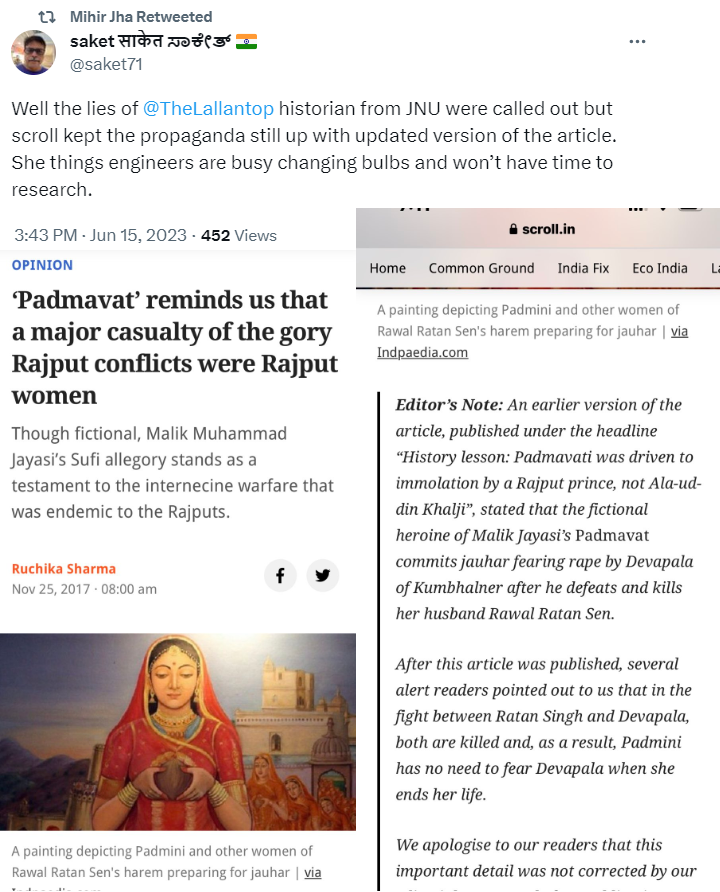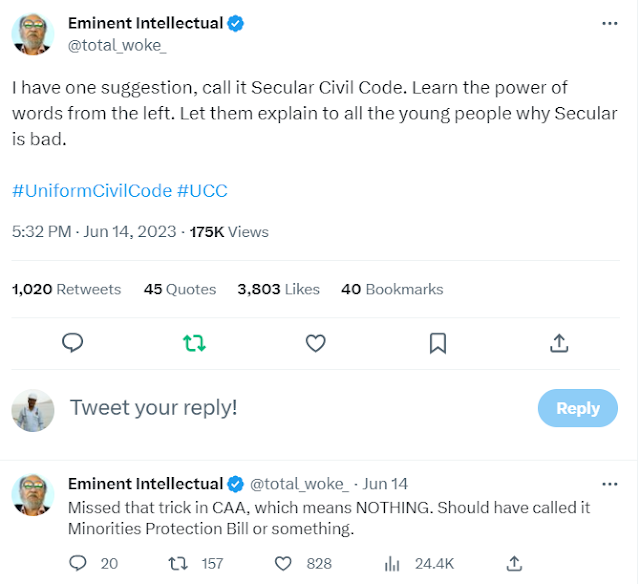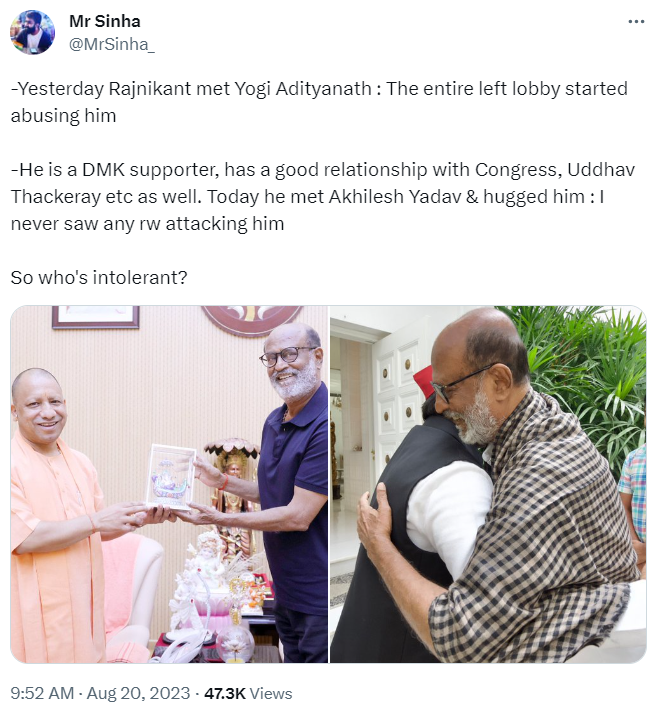1. South North
He is not in jail for what all certificates he had! He is in jail for being involved in #AntiNational activities and also spreading it! He is in jail for not following what schools or colleges educated him with but for following that #LaalKitaab which is curse to humanity!
J Sai Deepak writes: ‘Majoritarianism’ is used to gaslight Hindus
Cries of 'Hindu majoritarianism' ignore the fact that expression of Hindu will is based on civilisational nexus between Hindu worldview and this geography. Constitutional morality cannot display selective historical amnesia
Updated: June 22, 2023 12:43 IST
Majoritarianism is defined as that form of legitimate political authority which expresses the will of the majority. In a democracy governed by a constitution, the document typically prescribes the manner of expression of majoritarian will, and also circumscribes its limits. In other words, expression of the will of the majority within constitutional limits is constitutional. To what extent can the majority alter the very constitution itself and to what extent can such an exercise be interfered with by an unelected yet constitutional organ such as the judiciary is a topic for another day. For now, I will limit the scope of the discussion to the contemporary casual and pejorative use of “majoritarianism” in Bharat as a catch-all term to gaslight Hindus.
First, to cry “majoritarianism” in a democracy, without making out a case of unconstitutionality, is to question the majority principle which forms the very basis of a democracy. Second, in the context of Bharat, “majoritarianism” has become a code to insinuate “Hindu majoritarianism” because obviously Hindus commit the continuing sin of existing and that too in a (dwindling) numerical majority despite the best intentions and endeavours of organised, monotheistic, iconoclastic, expansionist, and colonising worldviews. Therefore, to atone for that sin, Hindus must constantly and unequivocally express contrition through cession of cultural, political, constitutional, and ultimately physical spaces. By not doing so, Hindus endanger the sense of safety and dignity of certain groups which pass off as “national minorities” despite being in the majority in certain states where Hindus are in the minority.
The lopsided tone and slant of this discourse will remain unchanged as long as it is stuck in the false majority-minority binary which is blind to both history and contemporary reality. Therefore, it is imperative to ground such discussions in a civilisational context, even when undertaken in relation to the Constitution. Such an approach would not be antithetical to the history of the Constitution. After all, certain group-specific remedies which have been spelt out in the Constitution, such as reservation, are premised on the claim of historical injustice. Considering this, to contend that the Constitution cares for history in certain contexts and is blind to history in others, must be treated as an argument of convenience, and hence rejected.
Applying this logic of historical awareness to the slur of “Hindu majoritarianism”, one would argue that the slur is illogical because it proceeds on the basis that since Hindus exist as a national majority, any expression of their collective will constitutes “Hindu majoritarianism” regardless of its constitutionality. Apart from betraying its imported origins and therefore the unoriginality of the allegation, those who cry “Hindu majoritarianism” conveniently ignore the fact that the expression of Hindu will is based on the undeniable and inseverable civilisational nexus between the Hindu worldview and this geography which the former worships as its sacred geography. Stated otherwise, the Hindu position is based neither on numerical majoritarianism nor on territorial nationalism, but on sacred civilisationalism wherein every inch of Bharat, as it existed, belongs to those who subscribe to the Bharatiya worldview and its values. But for this logic, how else can Bharat justify its continued claim over Muslim-majority Kashmir (including PoK), apart from relying on the factum of accession? After all, even a legal claim in the context of geopolitics is foregrounded by a more fundamental claim which could be cultural/civilisational, religious, linguistic or ethnic.
What is the sequitur or corollary to this position? Just as Bharat’s claim of Kashmir’s integral relationship with it is based on civilisationalism, which is obviously Hindu in character, the expression of Hindu will too is based on the irrefutable Hindu roots of Bharat. This position will remain unchanged, at least in principle, even in the event of demographic inversion of Hindu-majority Bharat (or parts of Bharat) to the detriment of Hindus. Therefore, those who deliberately ignore the sacral aspect of the Hindu’s relationship with Bharat by reducing it to numerical majoritarianism, are guilty of mischievously presenting the Hindu position as one based on brute numbers. To do so with a non-Abrahamic global minority, which continues to weather the bottomless and genocidal territorial hunger of two monochromatic worldviews, is the textbook definition of gaslighting.
While it is understandable, if not condonable, that political demagoguery is incapable of understanding these nuances or is least interested in them, one hopes that at least constitutional organs would appreciate this critical nuance instead of parroting the political rhetoric of “Hindu majoritarianism” as part of their discourse on constitutional morality. Such an expectation is both reasonable and legitimate since such organs take pride in being more refined and evolved than their legislative counterpart. However, such organs invariably fall back on the selective and elastic mantra of constitutionalism whenever difficult and uncomfortable questions relating to civilisational survival present themselves for fair adjudication. Interestingly, this mantra of constitutionalism displays greater elasticity when the subject of adjudication is human rights or minority rights but shrivels and shrinks with great alacrity when the civilisation itself looks to it for justice.
Some constitutional morality this is which, more often than not, loses sight of the forest for the trees and displays selective and stark historical amnesia. It’s almost as if the genocidal partition of Bharat on religious and civilisational lines, which is still within the living memory of quite a few, does not feature anywhere in the calculus of Indian constitutional morality.
Despite over seven decades of “independence”, since our institutions continue to be fond of quotes drawn from either side of the Atlantic (and rarely from this land’s vast and rich ocean of thought), I quote Justice Oliver Wendell Holmes Jr., the celebrated American jurist who served as an associate justice of the Supreme Court of United States, from his book The Common Law: “The life of the law has not been logic: it has been experience. The felt necessities of the time, the prevalent moral and political theories, intuitions of public policy, avowed or unconscious, even the prejudices which judges share with their fellow-men, have had a good deal more to do than the syllogism in determining the rules by which men should be governed. The law embodies the story of a nation’s development through many centuries, and it cannot be dealt with as if it contained only the axioms and corollaries of a book of mathematics. In order to know what it is, we must know what it has been, and what it tends to become. We must alternately consult history and existing theories of legislation. But the most difficult labour will be to understand the combination of the two into new products at every stage.”
To conclude, constitutional morality, which hopes to preserve the constitution and constitutionalism at the expense of history and to the detriment of the civilisation, will preserve neither the civilisation nor the Constitution.
INTOLERANCE
For leftists, coming of Modi is still a fluke, which will change with time; they think their propaganda is powerful and Modi is an error. They think that people of India are malleable and by propaganda they can be changed to put them (leftists) in power again, like in past. Same for western leftists who taunt Hindu culture. They see coming of Sunak or Vivek as a fluke. This will only change when Hindus keep coming and coming and coming in power. It takes time to change perception.






























No comments:
Post a Comment